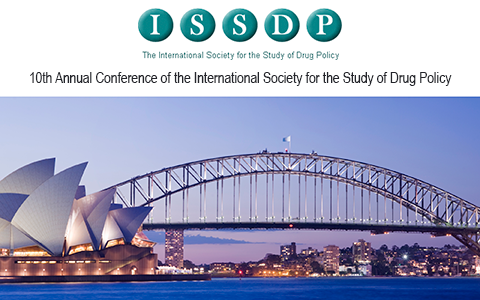ISSDP 2016 Conference report
The International Society for the Study of Drug Policy (ISSDP) 2016 conference was held in Sydney on 16th to 18th May. The conference attracted 198 delegates, with registrations from 34 different countries. Every continent was represented in the delegate list. This outstanding international spread was matched by an outstanding scientific program. The program covered the depth and breadth of drug policy research including sessions on policing and law enforcement, legalisation and decriminalisation – including specific insights into different models of cannabis regulation in US states, Canada, Latin America, Belgium and Spain, medical cannabis, drug treatment, prevention, harm reduction, HCV, policy processes, theories in drug policy (and the role of evidence in such spaces), cryptomarkets, new psychoactive substances , drug user organising and a specific session on Vietnam and drugs.
Over the three days, more than 80 papers were presented, along with six plenary sessions, and 9 panels. The opening keynote, Prof Louisa Degenhardt provided an overview of the Global Burden of Disease work and how it has evolved and improved over time. She argued that the GBD makes important contributions to drug policy scholarship, and noted the ways in which GBD can be used in drug policy work. The second keynote, Prof Le Giang from Vietnam described the evolving drug policy situation in South East Asia and more specifically in Vietnam. He noted the changing frames regarding drug use and people who use drugs over time: from social evil, criminals to patients. The third keynote presenter was Prof Simon Lenton. His keynote focussed on drug policy research and he urged us to consider the motivations we hold for working in this field. The lessons learnt over many years engaged at the interface of research and policy practice were much appreciated by delegates. The fourth keynote was Prof Scott Burris who discussed comparative policy analysis, from the perspective of the relationship between law and public health. He argued that we lack good theoretical models of the relationship between laws and health outcomes and our research needs to stop regarding this as a ‘black box’. The final keynote speaker was Senator Richard Di Natale, Leader of the Australian Greens. He discussed the challenges associated with moving from ideology and rhetoric into policy practice, and used the occasion to announce Greens’ policy for increased funding to drug harm reduction and treatment in Australia.
A plenary session reflecting on UNGASS 2016 provided delegates with some analysis and synthesis of the outcomes from UNGASS. Three perspectives: civil society (Margaret Hamilton), government (Tomas Zabransky) and research and monitoring (Angela Me) discussed their experiences of the UNGASS process. While there was agreement that many hopes from the process were not realised, there was also agreement that a number of important small shifts in drug policy were noteworthy in the outcomes document. These included specific inclusion of naloxone policies and reference to the need for proportional sanctioning in responding to illicit drug offenders.
Panels at the ISSDP 2016 conference included: “Marginal changes in international drug policy”; “Opportunities and challenges for drug user organising”; Access and equity in a new era of Hepatitis C treatment and care”; E-cigarettes and drug policy”; “Cryptomarkets: harms benefits and scope”; “Mathematical and simulation modelling for drug policy”; Substance use normalisation: policy and research implications”; “Power, inequality and drug policy”; and “New insights from revisions of ‘Drug Policy and the Public Good’”.
The 2016 ISSDP award for best early career researcher presentation went to Thu Vuong, for her presentation entitled “Economic evaluation comparing centre-based compulsory drug rehabilitation with community-based methadone maintenance in Hai Phong City, Vietnam”.
A vigorous twitter-feed occurred across the three days of the conference (with the conference trending on both Monday and Wednesday). Tweets from every parallel session demonstrated the extraordinary diversity of drug policy research that was presented, the key findings and new insights that have been generated and the challenges to existing approaches to drugs policy across the globe (twitter handle: #ISSDP2016).
The conference was proudly sponsored by the Drug Policy Modelling Program, the National Drug and Alcohol Research Centre, the ACT Government, The Kirby Institute, National Drug Research Institute, Indivior and the Alcohol Tobacco and Other Drug Association ACT.
The setting for the conference was the Q Station at North Head in Manly. This historic site, which was the primary quarantine station for all migrants coming in to Australia, provided a very picturesque setting for the conference. As the ISSDP President, Alex Stevens noted in his opening address, there was some irony in holding the meeting at this site: drug policy as the intersection of social control and public health.











